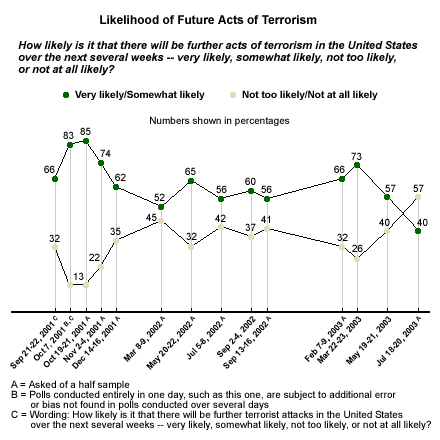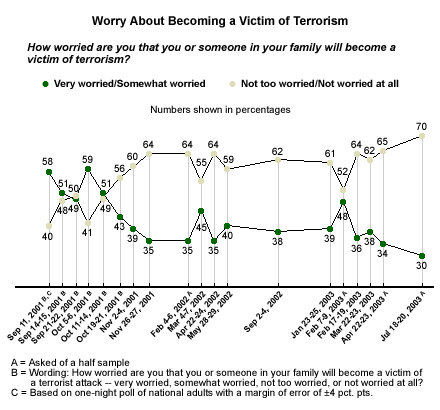When the news of the shooting in New York's City Hall broke last week, chaos ensued briefly across the city, as many feared there had been another terrorist attack. Nationwide, however, Americans are less nervous about possible terrorist acts than they have been since the Sept. 11 attacks.
Belief in Likelihood of Terrorism Shifts
According to a July 18-20 Gallup Poll*, for the first time since Gallup began asking the question in September 2001, more Americans believe further acts of terrorism in the United States over the next several weeks are "not too likely" or "not at all likely" (57%) than think they are "very likely" or "somewhat likely" (40%). Additionally, the poll shows the smallest percentage of Americans to date who think acts of terrorism are "very likely" -- just 7%.
The shift in public opinion takes on further significance when you consider that the current percentage of people who think future terrorist acts are likely is less than half the percentage who thought so in October 2001, shortly after the United States began military operations in Afghanistan, when the trend was at its highest point. Furthermore, the percentage of Americans who feel this way now is 33 points lower than it was in March 2003, in the midst of the war with Iraq.

Just 3 in 10 Are Worried About Becoming a Victim
While not as dramatic as the drop in the perceived likelihood of future terrorist acts overall, the American public's level of worry about personally becoming a victim of terrorism has also dropped to a post-Sept. 11 low. Currently, 30% of Americans say they are "very worried" or "somewhat worried" that they or a family member will become a victim of terrorism, while a majority (70%) are either "not too worried" or "not worried at all." Again, the percentage that continues to be worried is dramatically lower than the 59% who expressed worry in early October 2001, and somewhat lower than it was at the height of the Iraq war (38%).

Gender Gap Remains
More women than men believe that future terrorist acts are likely, and women are also more worried about becoming a victim of terrorism. Specifically, 47% of women think terrorist attacks in general are very likely or somewhat likely, compared to roughly a third of men (34%). Additionally, 37% of women are very or somewhat worried about personally becoming the victim of terrorism, compared to 21% of men.
Bottom Line
The May 1 announcement that heavy fighting in Iraq had ended, followed by the lowering of the terrorism alert level (from orange to yellow), probably contributed to a significant decrease in public sentiment that future terrorist acts are likely, as well as less personal worry about becoming a victim of terrorism. In general, the public has not felt this secure from terrorism in quite some time.
*Results are based on telephone interviews with approximately 500 national adults, aged 18 and older, conducted July 18-20, 2003. For results based on the total sample of national adults, one can say with 95% confidence that the margin of sampling error is ±5 percentage points.
